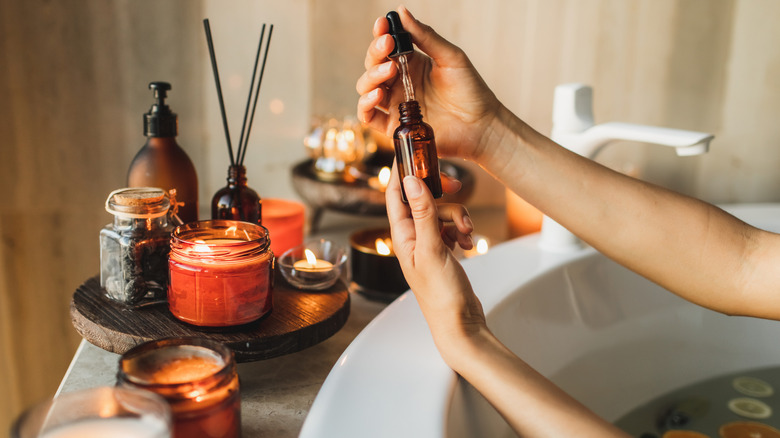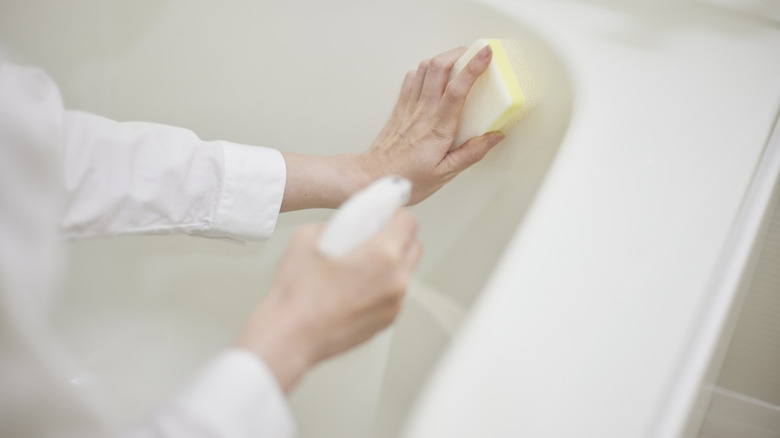The One Thing You Should Always Avoid If You Want A Clean Bathtub
Cleaning and maintaining your bathtub is probably at the top of your deep cleaning checklist to make every room in your home sparkle. While you might regularly tackle the tub with the right cleaning ingredients, it's also important to avoid certain items to help maintain this bathroom centerpiece so it stays clean and in good condition for years to come. You might already avoid harsh scrubbing agents that might otherwise damage the tub. However, it's also beneficial to be aware that certain personal care products may be off-limits for the sake of your bathtub, including excessive use of bath oils.
True to their name, bath oils are made with oil-based ingredients, including those that are made from plants or synthetic materials. Some plant-based versions are derived from a variety of essential oils, although some people might use diluted essential oils. Collectively, bath oils are advertised as tools that may help moisturize your skin, and they can also provide aromatherapy during a bath.
Despite all their possible benefits, bath oils are generally not recommended when using your bathtub. Not only can the oils create a dangerously slick surface, but they can also leave behind a residue on the tub. When left uncleaned, this can build up over time and become increasingly difficult to scrub away. Some tub surfaces, such as aluminum, might even incur permanent damage from stains. Experts also do not recommend using common carrier oils, such as argan, olive, and almond, as these can clog water pipes and jets. What's more, some types of bath oils might even contain artificial colors that can possibly stain the tub.
How to use bath oils in your tub with caution
The vast possibilities of potential damage are enough reasons for most experts to advise against the use of oils in a bathtub. However, this becomes a problem if you're already accustomed to using oils in your bath, as you might struggle with giving them up completely. It turns out that there may be a middle ground, with some major caveats to keep in mind, though. First, you should consider using commercial bath oils and diluted essential oils on an occasional basis only. Perhaps this might involve using oils only when your skin is exceptionally dry, such as during the winter months when it may need a bit more moisture.
Also, rather than diluting essential oils in a potential pipe-clogging carrier oil, try adding a few drops to a non-fragrance soap. Do not add essential oils directly into the water, as these will not disperse correctly due to their lack of water solubility. One recommendation is to use a ratio of 6 to 18 drops per 1 ounce of your body wash.
Cleaning you bath tub after using bath oils
If you choose to use oils once in a while, be prepared ahead of time to do a bit of extra cleaning. This is because there will likely be an oily residue on the tub at the end of your bath, and failing to clean it would lead to a build-up that can damage your tub or cause accidents. You can help prevent oil build-up by cleaning out your tub with soapy water after every use, and you can combine this with other easy ways to clean your bathtub. Be sure to wipe down the sides with a clean cloth as well. For residue that won't come clean with water alone, you can try applying a bit of baking soda to help scrub it away clean.
For any of the aforementioned tub surfaces, such as aluminum, you might consider avoiding using any types of oils at all, or else risk having to make some costly repairs. If you have a custom-made tub or a specialized bathtub style for your bathroom and are unsure whether bath oils are safe, consider contacting the manufacturer for advice. Finally, be sure to follow all product labels and use a non-slip mat to prevent falls while getting out of the tub.


